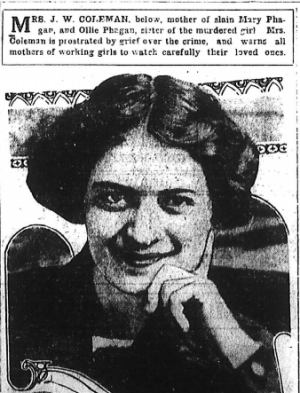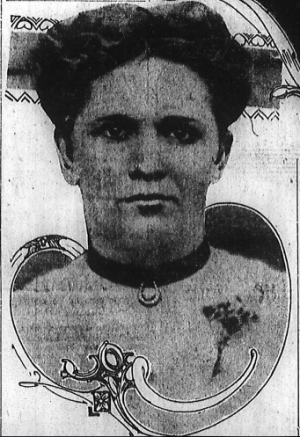
Mrs. J. W. Coleman, below, mother of slain Mary Phagan, and Ollie Phagan, sister of the murdered girl [above]. Mrs. Coleman is prostrated by grief over the crime, and warns all mothers of working girls to watch carefully their loved ones.
Another in our series of new transcriptions of contemporary articles on the Leo Frank case.
Atlanta Georgian
Tuesday, April 29th, 1913
Has the murderer of pretty little Mary Phagan slipped the net that the police most carefully spread for him?
Is the author of the crime that shocked the city and State with its terrible brutality still at large?
Is the mystery, as baffling in its myriad conflicting elements as it is revolting in its details still as far from solution as it was when the beaten and bruised little body of Mary Phagan was found lifeless in a pile of trash and litter in a Forsyth Street basement?
When the city detectives and Pinkertons picked up the twisted skelna of evidence this morning they admitted that they were as badly tangled as when they laid them down after working incessantly upon them until long after midnight.
They are positive, however, that the guilt will be almost certainly fixed before nightfall. It only remains to follow each thread of evidence out to
“To what person will the damning thread lead?” is the question that is holding the entire city in suspense. No other tragedy in years has so gripped the people as this one of the laughing, innocent girl lured to her death.
When the final truth is known will the accusing finger-point of guilt be leveled at—
Newt Lee, the negro night watchman, against whom suspicion was strongly directed to-day, although he at first was held only as an important witness.
Or—
Arthur Mullinax, of 60 Poplar Street, formerly a street car conductor, who was the first man arrested and seriously regarded as the possible murderer. The evidence against him is slight.
Or—
J. M. Gantt, an employee of the National Pencil Company until three weeks ago, arrested as he got off a car in Marietta yesterday. The evidence against him is far from convincing.
Or—
Geron Bailey, negro elevator man in the pencil factory, who was arrested at about the same time as Mullinax and held as a material witness.
Or—
Some man whose name has not been previously mentioned in connection with the case.
Police Expect Results.
The police are confident that they will know in a few hours the identity of the slayer.
Chief Beavers, Chief of Detectives Lanford, Detectives Black, Starnes, Hariett, Rosser and Bullard and Pinkerton operatives were on the case again early this morning. Out of the many clews obtained yesterday they expected to get a definite lead and bring order out of the confusion that hampered the first two days’ work.
They have everybody in custody against whom suspicion has been strongly directed. They have a mass of information and a mass of testimony, much of which is conflicting. From this they will eliminate the inaccurate and improbable and proceed carefully to weave the net of evidence.
No mystery in recent years has served to excite the public mind as the Phagan murder. Detective headquarters have been thronged with persons who have believed that they had clews to the perpetrator of the crime.
All day yesterday was a ceaseless procession going into the detectives’ offices and another procession coming out. The officers were harassed as much as they were aided.
Many Worthless Clews.
Countless persons came to give general information about Mullinax, or Gantt, or Lee, or Bailey. Others came to identify Mullinax as the man they had seen with a girl on a certain street at a certain time Saturday night. Others were sure that it was Gantt they had seen.
Some of the information was absolutely worthless and some was regarded as furnishing possible clews.
While some of the officers were hearing the various tales of these people, other detectives were putting the prisoners through a grilling examination of their whereabouts at every minute of Saturday night.
Third Degree for Lee.
Newt Lee, the black night watchman, was given the “third degree” in the belief that he knew much more about the crime than he professed. He showed signs of weakening several times, but each time recovered before he had made any admissions seriously damaging either to himself or any of the other prisoners.
The shifting of suspicion to Lee was the most startling development of this forenoon, although what basis it had in actual evidence is hard to determine. It is known that the Coleman family are inclined to believe that he knows a great deal more about the crime than he has been pleased to tell. Screams in the building were heard by persons in the livery stable nearby, according to stories current to-day. How could Lee have made his rounds every half hour and not have heard them, members of the Coleman family ask.
O. I. Bagley, shipping clerk for the Atlanta Milling Company, was with Gantt Saturday night and left him a few minutes after 10 o’clock, according to a statement to a Georgian reporter. Bagley declared:
“Gantt is but a casual acquaintance of mine, though I have known him for about a year. I do not believe he is the kind of man who would have committed the crime.
“I met him early Saturday night in the Globe pool room and talked to him some time. My brother and a friend of Gantt’s, named White, were playing a game of pool. Gantt does not play and we sat down and watched my brother and White. About 10 o’clock Gantt and myself strolled out of the pool room and walked around. We went a block or two out Whitehall Street, then turned and came back, walking back to Alabama Street and up Alabama to Broad Street. I told Gantt that I was going to catch a car and he said he would go back to the pool room. I noticed that he walked up Broad Street, my car came along and I went home. I caught the 10:30 o’clock car.
Had Started West.
“In the course of our conversation Gantt told me that he had left Atlanta to go to San Francisco and had gotten as far as St. Louis but had been held up there several days on account of high water. He said he then changed his mind and came back to Atlanta.
“He also told me that he probably would go to farming; that his mother had offered to give him a 500-acre farm near Marietta.
“That Gantt could have met the Phagan girl later in the night and committed the crime appears improbable to me, as most of his conversation was about him preparing to get married in August. He seemed to be very much in love with the young lady.
“Our meeting Saturday night was accidental. I had not seen him for three or four weeks and asked him where he had been. He then told me of going to St. Louis.”
* * *
Atlanta Georgian, April 29th 1913, “Guilt Will Be Fixed Detectives Declare,” Leo Frank case newspaper article series (Original PDF)

